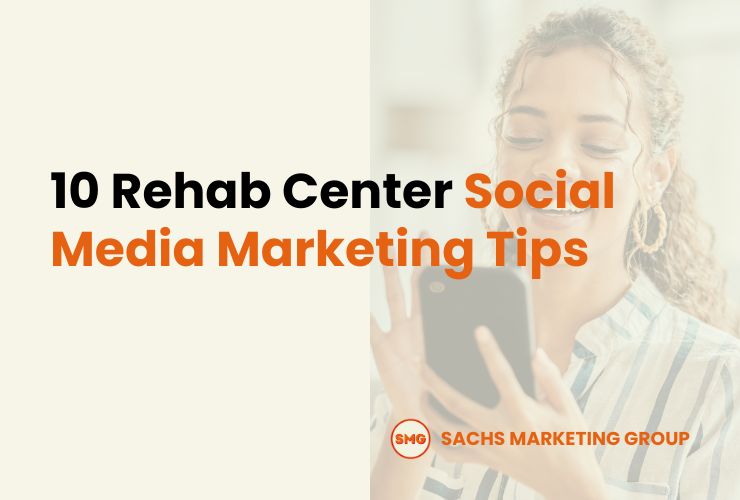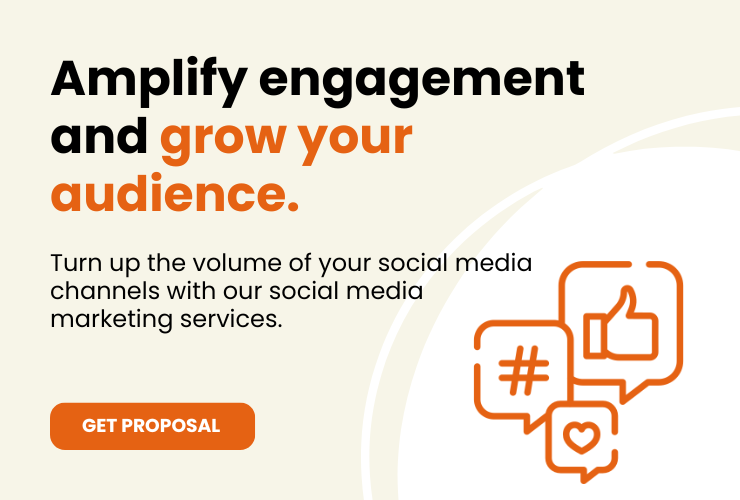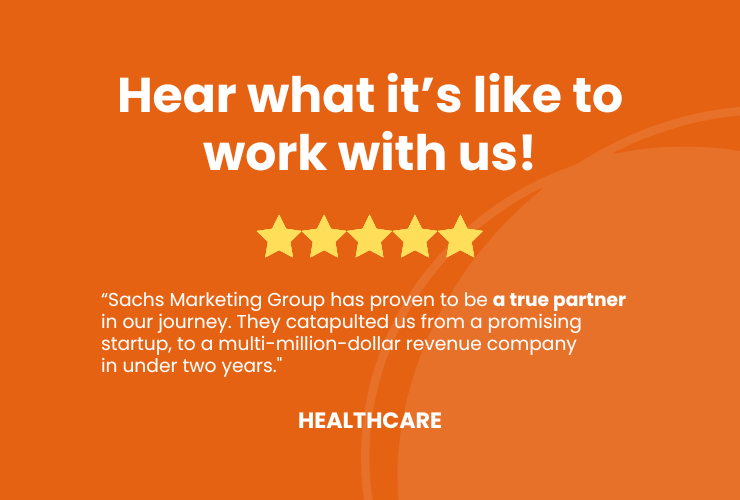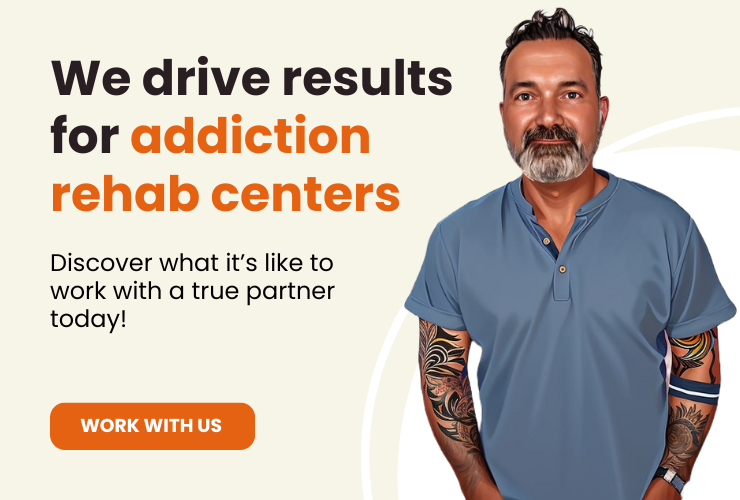Rehab center social media marketing can be a highly effective way to attract addiction treatment clients by raising awareness and breaking stigmas. It offers a platform to share success stories, educational content, and available treatments, thereby reaching potential clients who may need services. Through targeted social media campaigns, rehab centers can directly engage with individuals seeking help, making the path to treatment more accessible.
Are you struggling to make social media marketing work for your rehab center? Many rehab centers struggle to increase visibility and engagement with potential clients in the crowded social media space.
Fortunately, there are a few things you can do to overcome this challenge and create a social media marketing strategy that helps drive potential clients to your rehab center. Whether you’re running a residential rehab center, an outpatient rehab center, or any other type of addiction treatment center, investing the time to create a social media strategy will ensure your social media channels support your business.
Keep reading to discover 10 rehab center social media marketing tips.
Key takeaways
- Set clear objectives, such as increasing brand awareness or generating leads to effectively guide your social media strategy.
- Foster interaction by responding to comments and messages and hosting live Q&A sessions.
- Consider hiring social media marketing experts to develop and manage campaigns, ensuring compliance and maximizing impact.
Overview
Rehab Center Social Media Marketing Tips
To make the most out of social media, rehab centers need a well-defined strategy that focuses on offering value, building community, and effectively communicating the services they offer.
Here are some rehab center social media marketing tips to help you get started:
1. Define Your Social Media Marketing Goals
When it comes to rehab center social media marketing, it's not just about posting pictures or articles. The objectives need to be finely tuned to your niche. In the context of a rehab center, some typical social media marketing goals could be:
- Increase Brand Awareness: Let people know that your rehab facility exists and inform them about the unique services you offer, such as specialized therapy methods or unique treatment plans.
- Lead Generation: Use your social media platforms to guide potential clients to contact forms, sign up for newsletters, or directly reach out for consultations.
- Client Retention: Keep past clients engaged by sharing post-treatment tips and success stories, which may also encourage them to refer others.
- Community Building: Establish your rehab center as a supportive community for both those in recovery and their family members by creating and sharing useful, educational, and motivational content.
- Crisis Management: Use your platform to immediately address any negative reviews or misunderstandings that may arise, correcting false information or acknowledging mistakes transparently.
Each goal should have associated key performance indicators (KPIs), like the number of shares, likes, or website visits coming from social media, to measure effectiveness.
2. Reverse-engineer What Your Competitors Are Doing
Competitive analysis is even more critical in the specialized area of rehab center marketing.
Look at the types of content your competitors are posting. Are they posting more about the emotional aspects of recovery, or are they more focused on the medical facets of treatment? Identify the gaps and areas where your rehab center can offer something valuable and different. Examine the likes, shares, and comments their content receives. This will not only reveal the type of content that resonates with your target audience but also provide insights into the community’s needs and preferences.
Notice how frequently they post. Is it multiple times a day or just a few times a week? Match or exceed their posting frequency—but only if you can maintain the quality of content.
Keep an eye on any paid advertising they are doing. Are they using Facebook Ads to promote an upcoming webinar on addiction treatment methods, or perhaps Google Ads to drive traffic to their blog? These choices will indicate where they are finding the most value in paid promotion.
Check out what their clients are saying about them in reviews. If many people are praising their outpatient program, for example, consider highlighting the strengths of your own outpatient services.
By systematically dissecting your competitors' social media strategy, you can identify both strengths to emulate and weaknesses to avoid. Remember, the goal is not to copy, but to gain inspiration and insights for creating a more robust and effective strategy for your rehab center.
3. Identify Your Social Media Channels
Different social media platforms cater to different age groups, interests, and behaviors. For a rehab center focused on addiction treatment, it's important to identify the platforms where you are most likely to reach people in need of your services as well as their families and supporters.
- Facebook: Often used by a broad demographic, Facebook allows you to post longer, more in-depth articles and updates. You can also host live Q&A sessions about addiction treatment, enabling real-time engagement.
- Instagram: This visual platform is popular among younger adults. Use it to share inspiring testimonials, behind-the-scenes looks at your facility, and graphics that debunk myths about addiction. Check out our guide on How to Use Instagram for Business #Effectively to get started.
- TikTok: This is a great social media channel for short-form videos and reaching a younger audience. If you want to explore the benefits of this platform, check out this guide on using TikTok for business.
- Pinterest: Surprisingly effective for healthcare topics, Pinterest allows you to post visually appealing infographics or 'pin' educational blogs from your website, providing bite-sized information on addiction treatment.
- LinkedIn: This is your B2B platform. Share scholarly articles, network with healthcare professionals, and post job openings to attract qualified staff. Kickstart your campaign by learning how to use LinkedIn for B2B marketing.
- X (previously known as Twitter): With its fast-paced feed, X is ideal for sharing news updates, quick tips, and links to longer-form content. Use it to stay current and engage in trending topics related to addiction and mental health.
Before committing to any platforms, research where your target demographics spend their time online. Balance your approach to include platforms popular among both potential clients and their influencers—often friends and family who might be researching treatment options.
4. Create a Social Media Content Calendar
Managing multiple platforms can become overwhelming—this is where a social media content calendar comes in handy. The objective is to plan a well-rounded approach that includes various types of content specific to a rehab center.
- Daily Posts: These could be motivational quotes, quick tips for those undergoing treatment, or brief updates about your center. Make these short and shareable.
- Weekly Deep-Dive: Dedicate one day a week to a longer piece—perhaps a success story or an in-depth look at a particular treatment option.
- Themed Days: For instance, “Mental Health Mondays” could focus on the mental health aspect of addiction, while “Family Fridays” could provide resources for families supporting a loved one through treatment.
- Event Highlighting: If there are any important dates or events—like a guest speaker session or an open house—make sure these are highlighted well in advance.
- Reactive Posts: Leave some room in your calendar for unplanned, reactive posts. These could be based on current news or emerging trends related to addiction treatment.
- Engagement Checks: Allocate specific times in the week to engage with the community—answer queries, reply to comments, and possibly host a live Q&A.
- Analytics Review: Before planning the next week’s content, review performance metrics from the previous week to understand what's resonating with your audience.
- Platform-Specific Content: Make sure you're tailoring the content to the strengths and limitations of each platform. For example, content for Instagram could be more visual, while LinkedIn might be more focused on industry news and academic content.
By adhering to a content calendar, you'll ensure consistency, which is key to maintaining an engaged online community. Your audience will know what to expect and when to tune in, making your social media marketing efforts more impactful.
5. Share Educational Content from Your Website
Want to stand out as a reliable resource? Share educational content from your website. Take articles that dig deep into treatment options or the psychology behind addiction. This can help you shine as an expert in addiction treatment.
For example, post an article about the role of family in addiction recovery. Break down how different therapies work. Share success stories of those who have walked the road to recovery at your center.
But don't just stop at articles. Vary your content to keep your audience engaged. Think slideshows, videos, and more.
- Slideshows: Great for simplifying complex topics.
- Short Videos: A glimpse into daily life at your center can be compelling.
- Long Videos: Interviews with experts can provide a deep dive into addiction research.
By diversifying, you appeal to different content consumption habits. Whether it's reading, watching, or scanning, you've got something for everyone. This strategy can make your social media channels a must-visit resource for anyone seeking addiction treatment.
6. Engage with the Community
Community engagement is more than just posting content; it's about creating two-way conversations. Responding to comments or direct messages in a timely manner can create a sense of community and trust. You can also take the initiative by commenting on posts relevant to addiction treatment or recovery.
For example, if someone shares a post about celebrating six months of sobriety, a simple congratulatory message from your center can go a long way. Even hosting a monthly Q&A session on Facebook or Instagram can provide valuable interaction. You can address general questions about addiction treatment and introduce your team of experts, making your rehab center more relatable and trustworthy.
7. Leverage Hashtags
Hashtags serve as the backbone of discoverability on platforms like Instagram and Twitter. They can funnel users directly to your content when used correctly. But the key is to be strategic—use hashtags that are specific to your field and community.
For instance, using general hashtags like #recovery can get your post lost in a sea of unrelated content. Opt for more specific tags like #AddictionTreatment or even localized tags like #CaliforniaRehab. Periodically, you could create your own branded hashtag, like #RecoveryAt[YourCenterName], for clients to share their success stories.
- General Hashtags: E.g., #Recovery, #Wellness
- Specific Hashtags: E.g., #AddictionTreatment, #OpioidRehab
- Localized Hashtags: E.g., #CaliforniaRehab, #ThousandOaksRecovery
In summary, by engaging with the community and using hashtags wisely, your social media can become more than just a bulletin board—it can be a hub of meaningful connections and resources.
8. Invest in Social Media Advertising
Sometimes, relying solely on organic reach may not give you the results you desire. This is where paid social media advertising comes into play. Utilizing sponsored posts or pay-per-click ads can help you specifically target individuals who are actively seeking addiction treatment services.
Let's say you recently posted a video on outpatient treatments. You could run Facebook ads for addiction treatment and reach people who have shown interest in addiction recovery, ensuring the right eyes see your valuable content. The targeting options are extensive—you can specify demographics, interests, or even behaviors.
To run ads relating to addiction treatment, you may need to obtain LegitScript addiction treatment certification. This verifies you're a licensed treatment provider that can be trusted.
Running Facebook ads for addiction treatment is a great way to increase the visibility of your addiction treatment center or rehab services. Unlike other forms of advertising, such as print or billboards, social media platforms like Facebook offer a pay-per-click (PPC) option. This allows you to advertise and only pay each time someone clicks your ad. If your ad is optimized with amazing copy, you could create a steady stream of people contacting you for more information about your services. Launch several Facebook ads for addiction leads, monitor their results, and revise as needed.
9. Measure and Adapt
Performance metrics aren't just numbers; they're your roadmap to improvement. Monitoring key performance indicators (KPIs) like engagement rate, click-through rate, or lead conversion can provide invaluable insights into what's working and what's not.
For instance, if your Instagram posts are generating likes but not click-throughs to your website, it might be time to reconsider your call-to-action strategies. Adaptation is key. Use analytics tools to make informed decisions and tweak your strategies as needed.
- Engagement Rate: Measures likes, comments, and shares.
- Click-through Rate: Monitors how many clicked the link to your site.
- Lead Conversion: Tracks how many inquiries turn into clients.
10. Hire a Social Media Expert
While in-house efforts are admirable, there's a limit to what you can achieve without expert help. A dedicated social media expert specialized in the field of rehab and addiction treatment can be a game-changer for your marketing strategy.
They can take the burden off your in-house team, allowing them to focus on core tasks. These experts not only understand social media algorithms but can also craft campaigns that resonate with your target audience. Imagine having a well-executed campaign during Addiction Recovery Month that results in not just likes, but real inquiries and admissions.
Need Help with Your Social Media Marketing?
You know leveraging the power of social media marketing can help your rehab center, but you simply don’t have the time or resources.
Let Sachs Marketing Group handle social media marketing for your rehab center so you can focus on helping your clients. With over a decade of specialized experience in rehab center social media marketing, we have the first-hand experience you need to drive targeted traffic and convert inquiries into admissions.
Schedule a call with Eric Sachs and discover how Sachs Marketing Group can help create and manage a social media marketing strategy that drives potential clients to your rehab center.
Get a free, no obligation review of your digital marketing strategy!
"*" indicates required fields





